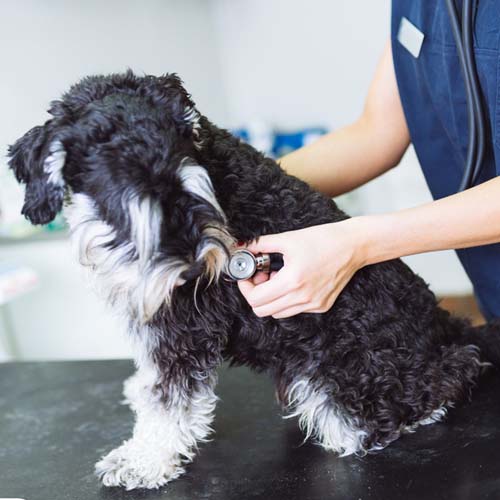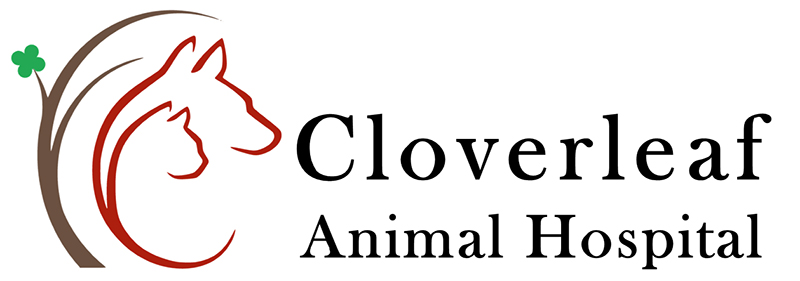Dog Wellness Exams
Everything You Need to Know About Dog Wellness Exams
At Cloverleaf Animal Hospital we provide the best dog wellness exam services for your pet.

What is involved in a dog wellness exam?
A dog wellness exam primarily covers a good physical exam and history—the history from the owner and the physical exam by the veterinarian and the healthcare team here.
Dr. Adam Stout
Cloverleaf Animal Hospital
How does dog wellness impact the longevity of my pet?
Well, keeping a dog healthy keeps him living longer. That’s the main goal for us, the staff at hospitals, to keep them healthy. We want to keep them around for a long time. So that’s the goal. That’s how it works.
How soon should I bring my pet in to see a veterinarian for a wellness exam?
If a veterinarian has never seen them, contact a clinic, and get that set up as soon as you can. If you’re a regular client and we’ve been seeing your pet regularly, we typically do wellness exams once a year.
Will additional testing be needed beyond a wellness exam?
Yes. Something that’s not considered not part of our wellness exams, or the simple physical exam, additional testing would be a fecal/stool exam to look for parasites. For dogs, we recommend the heartworm and tick test. Depending on the age and lifestyle, we’re going to be talking about preventative care, and we’ll do some blood work to look at what’s going on on the inside.
How will a veterinarian assess dog wellness?
We put everything together like a puzzle. We go off the history that you, as an owner, provide us. Then, everything down to the physical exam, we cover the heart, lungs, eyes, and ears, from nose to tail, a good, solid physical exam. We put all that together if any of those additional tests are part of that wellness exam, and then we assess how healthy your dog is today.
What are some good wellness recommendations my vet is likely to make?
You may hear us say your dog has some tartar on his teeth. We’re going to recommend a dental cleaning. If there’s severe dental disease, we’re going to recommend extractions. If there are fleas and ticks, we will recommend products to take care of that. If we’ve lapsed on vaccines, we’re going to recommend vaccines, such things as preventative care. This pet’s getting a little older; we should run some blood work. We should check some internal organ functions and see what’s going on and where we’re at.
What are some possible environmental factors that can affect dog wellness?
Just things as simple as what’s around in the house. Is your dog known for getting into the trash? Are there toxins around? Are there plants we need to be concerned about? Does your dog maybe get some people food that they’re not supposed to have, snacks like that? Some health issues are even related to that that people don’t think about. Is your dog outside? Do they run property? There are issues there that would worry people, like what they will get into. Is there any road danger? Is there a chance of getting hit by cars? So there are a lot of environmental factors.
Why is early detection of health issues in my dog so important?
What is geriatric dog screening?
Geriatric dog screening is just an old dog screening. You may ask, “How do you know if my dog is geriatric?” It depends on the age and the breed of the dog. The older, bigger dog, like Great Danes, those dogs are geriatric earlier at a younger age than, say, that little Chihuahua. We look for things that we start to see in geriatric patients: are they losing weight? Are there early signs of arthritis? Is there a cataract starting? Are there issues that are starting now that we expect from geriatric patients that we need to deal with now to treat and prevent that and help them live a little longer and be more comfortable?
Will my vet suggest allergy testing for my dog?
Typically not on a routine exam. If there are allergies, chronic skin issues, or rare GI issues, that’s kind of case-specific. So yes, if you have a dog that’s itching all the time and there are allergy issues, we are going to recommend some allergy testing, including environmental allergies and food allergies.
If you still have other questions and you’d like to reach out to us, you can call us directly at (330) 948-2002, email us, or reach out on social media. But please do reach out, and we’ll get back to you as fast as we can.
Veterinary Services
Below are all of the veterinary services we offer at Cloverleaf Animal Hospital. If you have any questions regarding our services, please feel free to call us.
